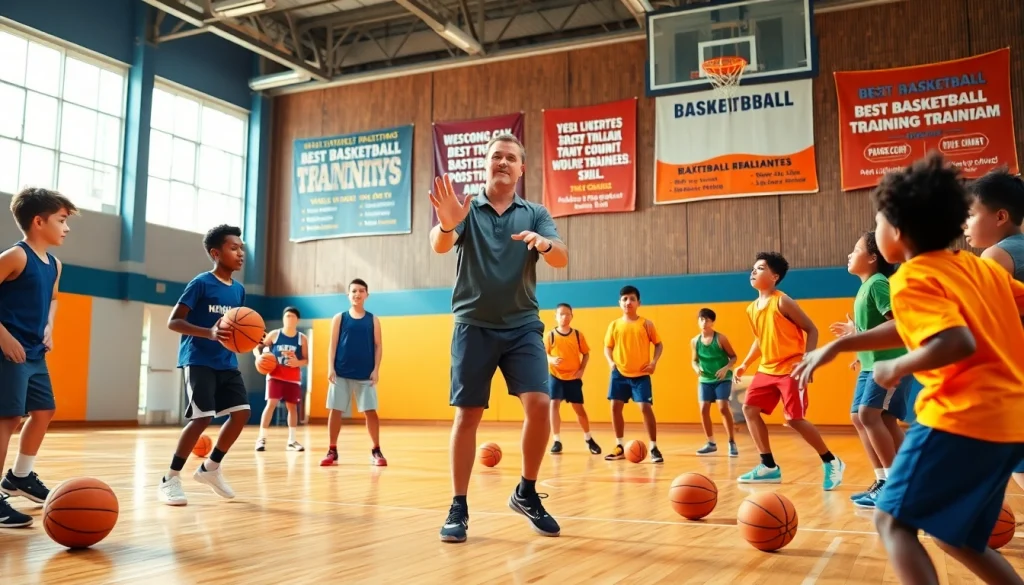Understanding Basketball Training Programs
What Are Basketball Training Programs?
Basketball training programs are structured systems designed to enhance a player’s skills, physical fitness, and overall understanding of the game. These programs can vary significantly in scope, duration, and target audience, ranging from local clinics and community workshops to high-level training camps led by experienced coaches. Regardless of their format, the primary goal of these programs is to develop more competent, well-rounded players who can excel in both competitive and casual environments.
The Importance of Structured Training
Structured training is crucial for any athlete seeking to improve their performance. In the context of basketball, more than just practicing shots or running drills, a structured training program encompasses various aspects of player development. This includes skill advancement, conditioning, strategic understanding, and psychological preparation. A well-organized program ensures that all essential components are addressed systematically, leading to holistic growth as a player.
Benefits of Participating in Training Programs
Participating in training programs provides numerous benefits that extend beyond mere skill enhancement. They foster discipline by requiring adherence to schedules and training regimens. Athletes often report improved self-confidence following training, as they see measurable progress in their abilities. Additionally, these programs allow participants to compete against others, which helps to develop not only talent but also the mental toughness required in competitive settings.
Types of Basketball Training Programs
Skill Development Programs
Skill development programs focus on refining specific basketball skills such as shooting, dribbling, passing, and defensive maneuvers. They often employ drills that replicate game scenarios, ensuring players are prepared to perform under pressure. Programs such as those offered by best basketball training programs, emphasize individualized coaching to help athletes identify weaknesses and enhance their strengths.
Conditioning and Strength Training
Conditioning incorporates physical fitness into basketball training, ensuring that athletes are not only skilled but also physically prepared for the rigors of the game. Strength training enhances overall physical capabilities, focusing on key muscle groups that contribute to performance in basketball. Effective conditioning programs also incorporate agility, endurance, and flexibility to establish a well-rounded athletic foundation.
Team vs. Individual Training Programs
Team training programs emphasize collaboration among players, fostering communication, and team dynamics. These programs often include drills that focus on teamwork, such as scrimmages and tactical plays. In contrast, individual training programs allow players to focus intensely on their personalized development, which may include one-on-one coaching and targeted skill drills that bring focus to specific areas needing improvement.
Finding the Best Basketball Training Programs
How to Research Training Options
Researching training options involves examining various factors, including program reputation, coaching staff, training methodologies, and athlete testimonials. Online resources, such as social media platforms and specialized basketball forums, can provide valuable insights and reviews. Observing training sessions or speaking directly with coaches can also significantly inform decisions about which program aligns best with a player’s goals.
Evaluating Coaching Credentials and Experience
Coaching credentials are vital when selecting a basketball training program. Coaches with backgrounds in professional or collegiate basketball often have the experience needed to guide players effectively. Their understanding of what it takes to succeed at higher levels can greatly benefit aspiring athletes. Prospective players should inquire about a coach’s track record with player development and coaching styles before committing to a program.
Finding Programs Near You
Utilizing online directories and local basketball associations can help players find programs in their area. Networking within the local basketball community can lead to discovering hidden gems, such as training camps, clinics, or personal trainers dedicated to developing talent. Engaging with local sports stores, gyms, and recreation centers can also provide helpful contacts and resources for finding suitable programs.
Success Stories from Top Basketball Training Programs
Case Studies of Successful Athletes
Examining the success stories of athletes who have emerged from renowned basketball training programs can be a source of inspiration. For instance, players like Stephen Curry and Kevin Durant have utilized various training methodologies and coaching insights from their formative years, demonstrating how targeted training can lead to elite performance. These case studies not only highlight the effectiveness of structured training but also serve as motivational examples for aspiring players.
What to Learn from Elite Training Programs
Elite training programs often revolve around techniques that maximize player potential. Key takeaways from these programs include the importance of a comprehensive skill set, the integration of physical conditioning, mental resilience training, and the value of consistent practice. Emulating the strategies used by successful programs can equip players with the tools necessary for elevating their games.
Testimonials and Reviews
Authentic testimonials from previous participants provide invaluable insights into the effectiveness of basketball training programs. Positive feedback regarding coaching styles, curriculum structure, and athlete development can enhance the credibility of a program. When assessing programs, prospective players should prioritize those with a track record of positive results solidified through documented athlete success and satisfaction.
Maximizing Your Training Experience
Setting Personal Goals for Improvement
Setting personal goals is fundamental to maximizing the training experience. Athletes should establish clear, measurable, and specific objectives related to their skill development and performance. By setting goals, participants can track progress and maintain motivation throughout their training cycles, and they can shift their focus as needed based on feedback and results.
Monitoring Progress and Performance
Effective monitoring involves keeping detailed records of performance metrics and improvements. This could include logging shooting percentages, rebound and assist numbers, and physical fitness evaluations. Regular check-ins with coaches to review progress can help maintain accountability and allow for adjustments in training regimens. Measurement of progress can also include subjective assessments, such as self-evaluations or peer feedback.
Incorporating Feedback into Your Training
Feedback is a critical element in the training process. Athletes should embrace constructive criticism from coaches and peers to refine techniques and improve performance. Incorporating feedback can also involve peer review, where players support each other’s growth by offering insights and encouragement. Regular reflection on this feedback will help in continuously evolving as a player, ensuring that growth is a constant focus of development.





